Hiring a software engineer intern can be an incredible advantage for your development team, bringing in fresh perspectives and driving innovation. However, many companies often struggle with identifying the right candidates who have the balance of theoretical knowledge and the practical skills necessary to thrive. It's important to recognize the specific qualities you want in a candidate, such as adaptability, problem-solving skills, and a solid understanding of fundamental coding principles.
In this article, we provide a comprehensive overview of the software engineer intern hiring process, from crafting effective job descriptions to structuring interviews. We also explore the platforms where you can find top intern candidates and discuss the differences between frontend and backend roles. To further enhance your hiring strategy, consider checking out our software engineering assessment test.
Table of contents
Why Hire a Software Engineer Intern?
Hiring a software engineer intern can be a strategic move for your company. These budding professionals bring fresh perspectives and up-to-date knowledge of the latest programming languages and technologies. They can assist with ongoing projects, help tackle backlogs, and even contribute innovative ideas to your team.
To determine if you need an intern, consider your current workload and project pipeline. Do you have tasks that could benefit from additional support? Are there small-scale projects that could serve as learning opportunities? Identify areas where an intern could contribute while gaining valuable experience.
Bringing on an intern is also an excellent way to evaluate potential full-time hires. You can assess their skills, work ethic, and cultural fit over an extended period. This approach often leads to more successful long-term hires and can be more cost-effective than traditional recruitment methods.
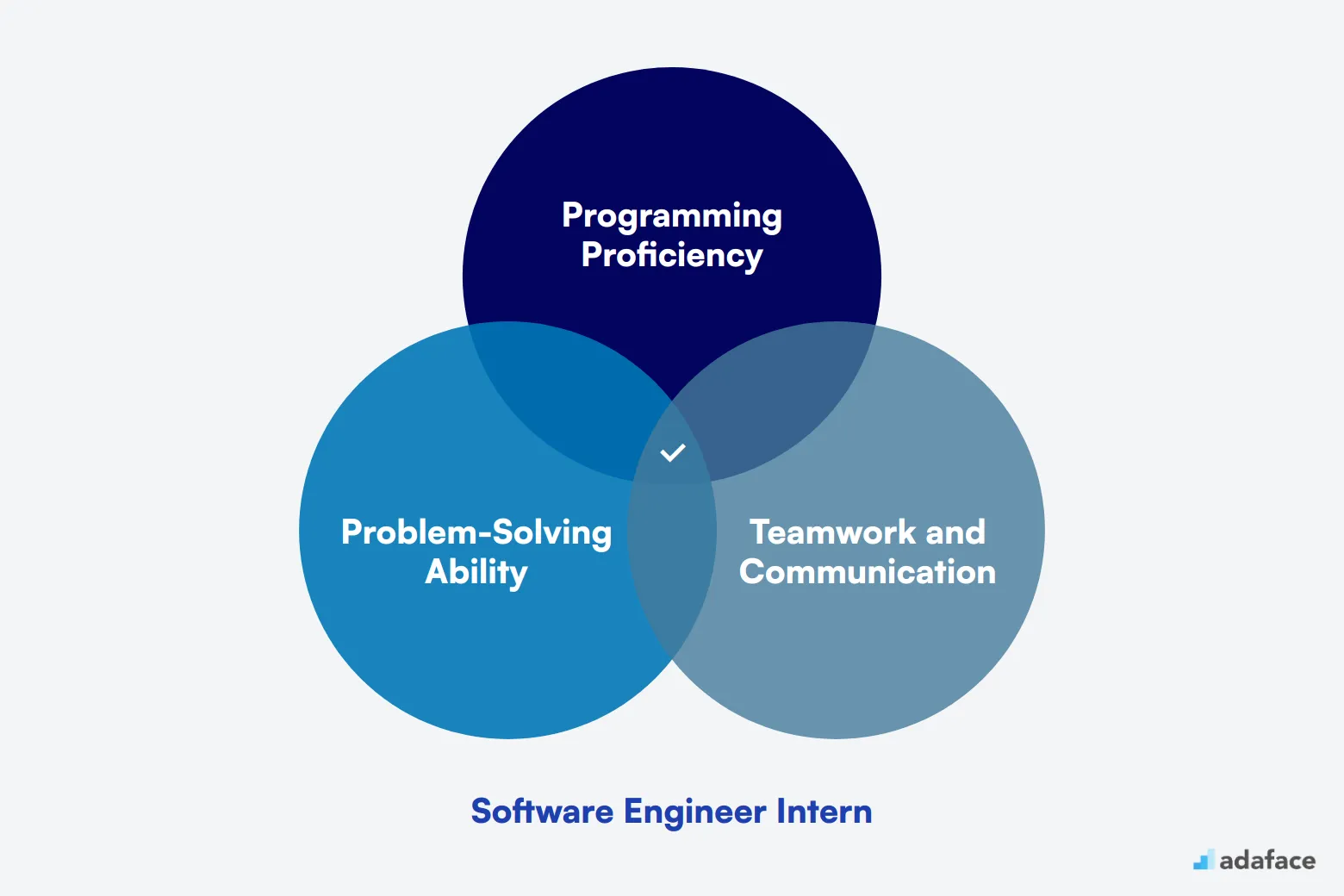
Software Engineer Intern Hiring Process
The hiring process for a Software Engineer Intern typically takes about 4-6 weeks. Here's a quick overview of the timeline and steps involved:
- Post a well-crafted job description on relevant platforms
- Review resumes (expect responses within 3-4 days)
- Conduct skill assessments or coding tests (1 week)
- Interview shortlisted candidates
- Make an offer to the best candidate
Each step requires careful consideration to ensure you find the right fit for your team. In the following sections, we'll dive deeper into these steps, providing checklists and materials to help streamline your hiring process.
Identifying Key Skills and Qualifications for Software Engineer Interns
Creating a candidate profile for a Software Engineer Intern can be tricky. Recruiters often confuse required skills with preferred skills, which can lead to a narrowed talent pool. Understanding the difference between what is absolutely necessary and what can be a bonus is key to finding the right fit for your team.
When evaluating potential candidates, you should focus on essential skills such as programming proficiency, problem-solving ability, and teamwork. Additionally, consider other qualifications that may give candidates an edge, like previous project experience or familiarity with tools and technologies relevant to your organization.
| Required skills and qualifications | Preferred skills and qualifications |
|---|---|
| Currently pursuing a degree in Computer Science or related field | Previous internship or project experience in software development |
| Strong understanding of data structures and algorithms | Familiarity with version control systems (e.g., Git) |
| Proficiency in at least one programming language (e.g., Java, Python, C++) | Knowledge of web development technologies (HTML, CSS, JavaScript) |
| Basic knowledge of software development methodologies | Experience with database systems (SQL or NoSQL) |
| Excellent problem-solving and analytical skills | Understanding of cloud computing platforms (AWS, Azure, or GCP) |
How to Write an Effective Software Engineer Intern Job Description
Creating a compelling job description is key to attracting top software engineering intern talent. Here are some quick tips to help you craft an appealing posting:
Highlight key responsibilities and potential impact: Clearly outline the intern's duties and how their work will contribute to real projects. This shows the role's value and attracts motivated candidates.
Balance technical requirements with soft skills: While coding proficiency is important, don't forget to emphasize teamwork, communication, and problem-solving abilities. A well-rounded intern brings more to the table.
Showcase your company culture and learning opportunities: Highlight unique aspects of your work environment and the chance to learn from experienced developers. This can set you apart from other internship offerings.
Be clear about qualifications: Specify required skills, preferred programming languages, and any academic requirements. This helps ensure you attract software engineer intern candidates who match your needs.
10 Platforms to Hire Software Engineer Interns
Now that you have crafted a solid job description, it's time to list your internship opportunity on job platforms to attract potential candidates. These platforms are essential for sourcing a pool of talented software engineer interns who match your criteria.
Ideal for finding a large pool of candidates and networking with professionals. Suitable for full-time intern positions.

AngelList
Great for connecting with talent interested in startups and innovative companies. Best for startup roles and entrepreneurial environments.
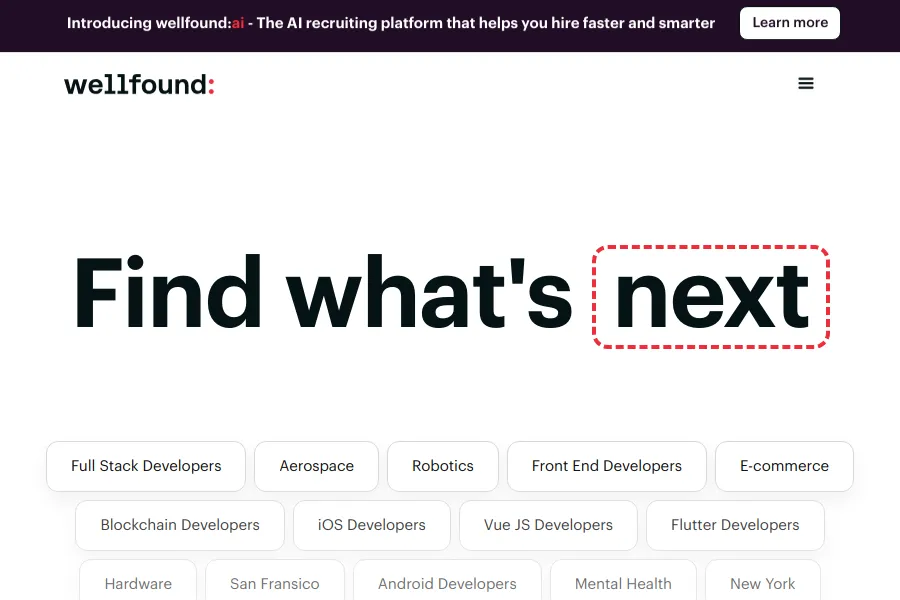
Indeed
A wide-reaching job board suitable for posting full-time positions with a diverse range of candidates.

The remaining platforms to consider cover a wide range of needs. LinkedIn and Glassdoor are great for full-time intern positions, with LinkedIn offering a broad networking scope and Glassdoor providing insights into company culture. AngelList is perfect for startups looking for entrepreneurial minds, while Remote.co and FlexJobs cater to remote work seekers. For short-term or freelance projects, Upwork is a fantastic option. Lastly, Craigslist offers local reach for part-time roles. Use these resources wisely to diversify your candidate pool. To further enrich your recruitment strategy, explore skills-based hiring techniques.
Keywords to Look for in Software Engineer Intern Resume
Screening resumes is a smart way to sift through the multitude of applications you receive for a software engineer intern position. By focusing on specific keywords, you can quickly identify candidates who meet the basic requirements and possess the desirable skills for the role.
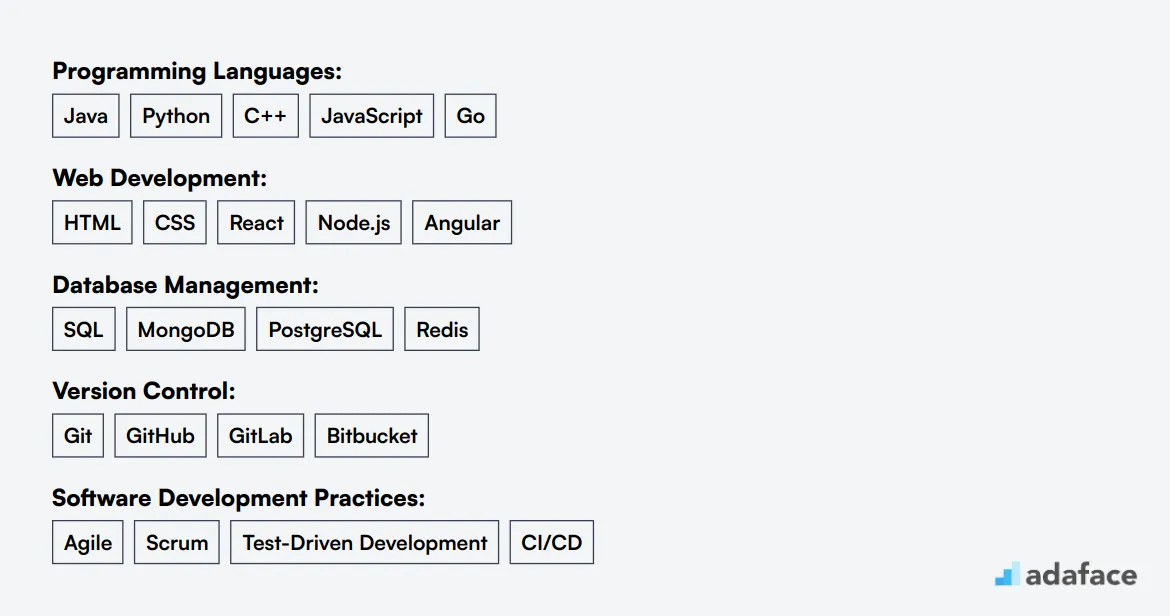
Start by identifying the primary and secondary keywords related to the role. Look for terms like 'data structures and algorithms', 'Java', 'Python', and 'C++' which indicate programming proficiency. Also, keep an eye out for mentions of 'problem-solving' and 'software development methodologies'. Shortlist resumes that reflect these keywords as they align well with the job description.
Leveraging AI tools can streamline your resume screening process by automating keyword matching. You can use language models to filter resumes based on specific criteria. By providing these tools with a list of required skills and preferences like 'version control systems' and 'web development technologies', they can help identify suitable candidates more efficiently.
Here's a sample prompt you can use to screen resumes using AI tools:
TASK: Screen resumes to match job description for software engineer intern role
INPUT: Resumes
OUTPUT: For each resume, provide the following information:
- Email id
- Name
- Matching keywords
- Score (out of 10 based on keywords matched)
- Recommendation (detailed recommendation of whether to shortlist this candidate or not)
- Shortlist (Yes, No or Maybe)
RULES:
- If you are unsure about a candidate's fit, put the candidate as Maybe instead of No
- Keep recommendation crisp and to the point.
KEYWORDS DATA:
- Education (Computer Science, Data Structures, Algorithms)
- Programming Languages (Java, Python, C++)
- Basic Skills (Problem-Solving, Software Development Methodologies)
Recommended skills tests for Software Engineer Interns
Skills tests are a great way to evaluate Software Engineer Intern candidates beyond their resumes. They provide objective data on a candidate's technical abilities and problem-solving skills. Here are the top tests we recommend for assessing Software Engineer Interns:
Software Engineering Test: This software engineering online test evaluates candidates on core concepts like data structures, algorithms, and system design. It's a good starting point to gauge overall software engineering knowledge.
Data Structures Test: A strong grasp of data structures is fundamental for any software engineer. The data structures online test assesses candidates' understanding of arrays, linked lists, trees, and graphs.
Problem Solving Test: Software engineering often involves creative problem-solving. A problem solving test can help identify candidates who can think critically and approach challenges methodically.
Programming Language Tests: Depending on your tech stack, consider language-specific tests. For example, use a Python online test or Java online test to evaluate proficiency in these popular languages.
Coding Test: Finally, a hands-on coding test allows you to see how candidates apply their knowledge in practice. This can reveal their coding style, attention to detail, and ability to write clean, efficient code.
Recommended Case Study Assignments for Hiring Software Engineer Interns
Case study assignments can be a valuable tool in assessing the skills and problem-solving abilities of candidates for software engineer internships. However, they can also be time-consuming and may lead to low participation rates, potentially causing you to miss out on talented candidates. Despite these drawbacks, well-designed case studies remain popular for their effectiveness in revealing candidates' practical knowledge. Below are some recommended case study assignments.
API Development Task: This involves creating a simple RESTful API for a basic application. It tests the intern's understanding of web services, HTTP methods, and routes. This task is particularly useful because it provides insight into a candidate's coding ability and familiarity with backend concepts, making it a good fit for those applying for software engineering roles. Learn more about relevant skills in our skills required for software engineer intern guide.
Data Structure Problem: Assign a problem that requires the candidate to implement and manipulate data structures like trees or graphs. This assignment is vital for evaluating analytical skills and understanding of algorithms, which are critical for software development tasks. It offers a chance to assess how candidates approach complex problems.
UI/UX Design Mockup: Task candidates with designing a user interface for a simple application. This assignment evaluates their ability to create user-friendly and visually appealing designs. While not a typical focus for software engineers, it highlights creativity and attention to detail, useful skills in any development role.
How to Structure Interview Stage for Hiring Software Engineer Interns
Candidates who successfully pass the initial skills tests should advance to the technical interview stage, where their hard skills are evaluated more deeply. While skills tests are effective at filtering out unfit candidates, they do not always identify the best-suited candidates for the role. In the technical interview, it's crucial to assess candidates through pointed questions that reveal their problem-solving abilities, coding skills, and understanding of software engineering concepts.
Here are some example interview questions to consider for this role: 1. Can you explain the difference between data structures and algorithms? This question helps assess their foundational knowledge. 2. How would you approach debugging a complex software issue? It shows their problem-solving capabilities. 3. Can you write a simple function in JavaScript to reverse a string? Tests coding skills in a practical way. 4. Describe a time when you had to learn a new technology quickly. How did you approach it? This evaluates adaptability and learning ability. 5. What do you understand by software design patterns? This question checks their theoretical understanding of system design.**
The Cost of Hiring a Software Engineer Intern
The cost of hiring a Software Engineer Intern varies widely depending on location and company size. In the United States, the average annual salary ranges from $41,355 to $139,392, with a median of about $84,954. Other countries have different salary ranges, with India's median at ₹531,259, Australia's at AUD 77,300, and Canada's at CAD 59,132.
Remember that salary is just one part of the total cost. Additional expenses may include recruitment fees, onboarding costs, and potential benefits or perks offered to interns. Always consider your budget and the local market rates when determining compensation for Software Engineer Interns.
Software Engineer Intern Salary in the United States
The average salary for a Software Engineer Intern in the United States is approximately $84,954 per year. Salaries can range from about $41,355 for entry-level positions to up to $139,392 for those with more experience or in high-demand areas like Silicon Valley and New York City. As a recruiter, it's important to consider location and company size when determining a competitive salary offer.
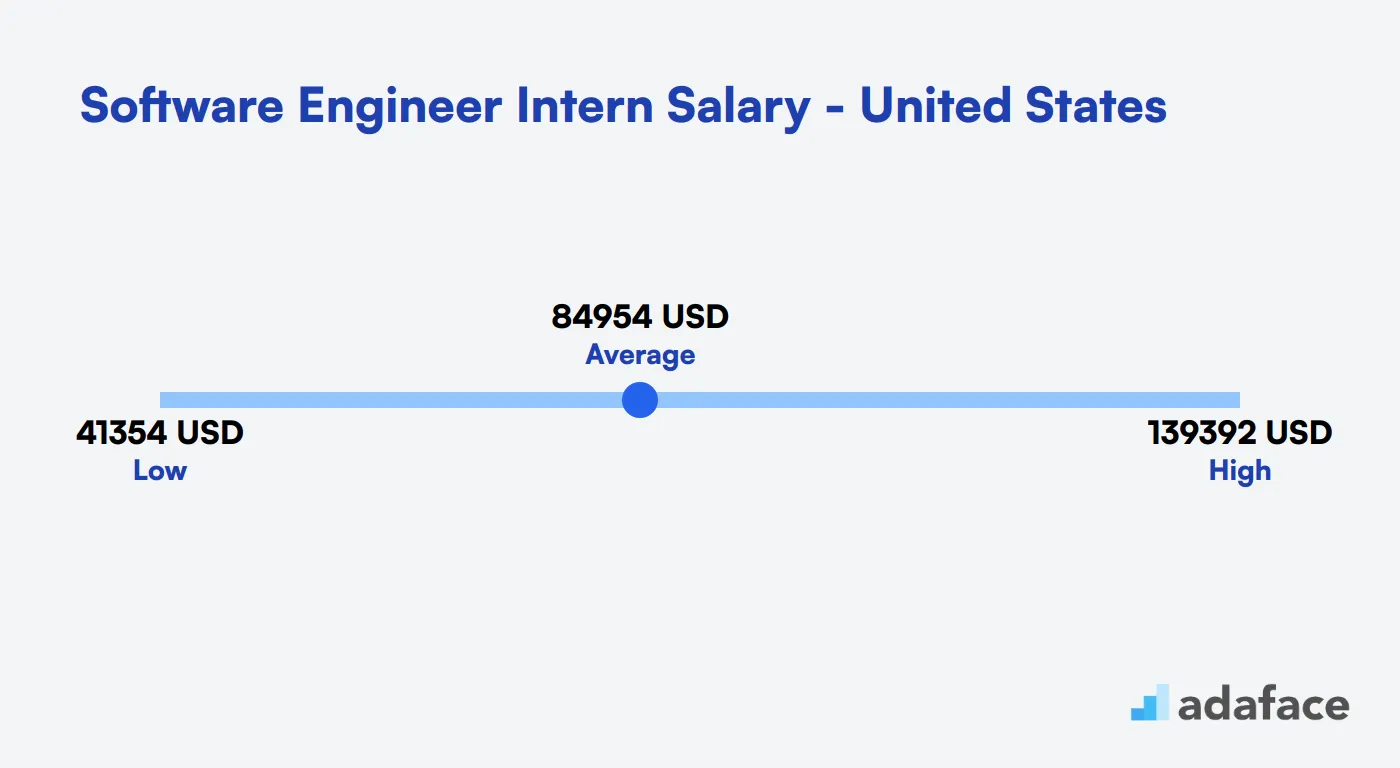
Software Engineer Intern Salary in Australia
In Australia, Software Engineer Intern salaries vary by location. In Sydney, interns can expect to earn between AUD 74,600 and AUD 93,000 annually, with a median of AUD 83,300. Melbourne offers slightly lower rates, ranging from AUD 48,400 to AUD 60,200, with a median of AUD 54,000.
The national average for Software Engineer Interns in Australia is approximately AUD 77,300 per year. Keep in mind that these figures can fluctuate based on factors such as company size, industry, and the intern's skills and experience.
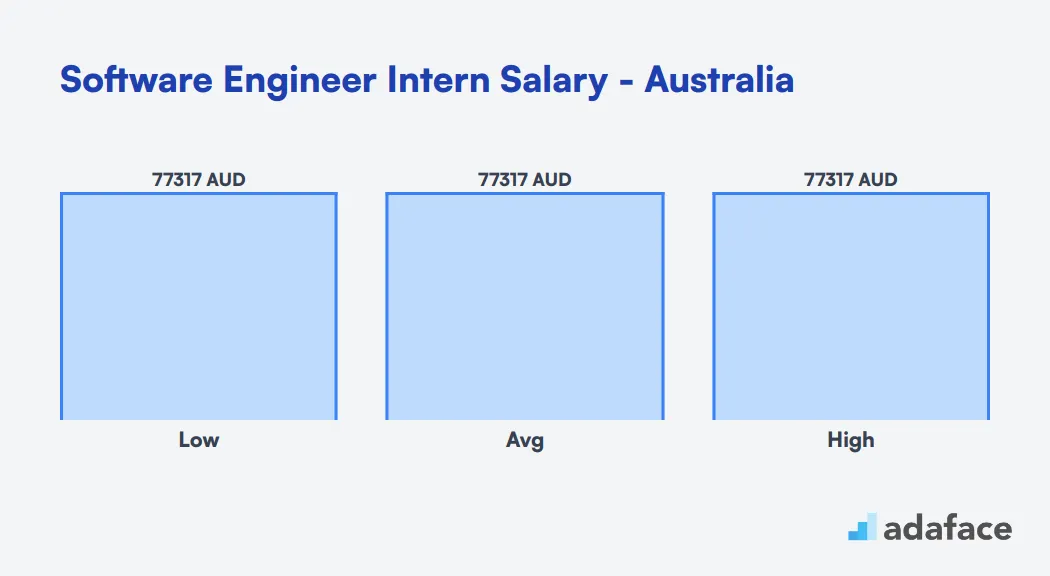
Software Engineer Intern Salary in Canada
In Canada, Software Engineer Intern salaries vary across different cities. Based on recent data, Vancouver offers the highest average salary at CAD 108,987 per year, while Montreal has the lowest at CAD 51,913.
The national average for Software Engineer Interns in Canada is approximately CAD 59,132 per year. Toronto, a major tech hub, offers an average salary of CAD 75,637, which is above the national average.
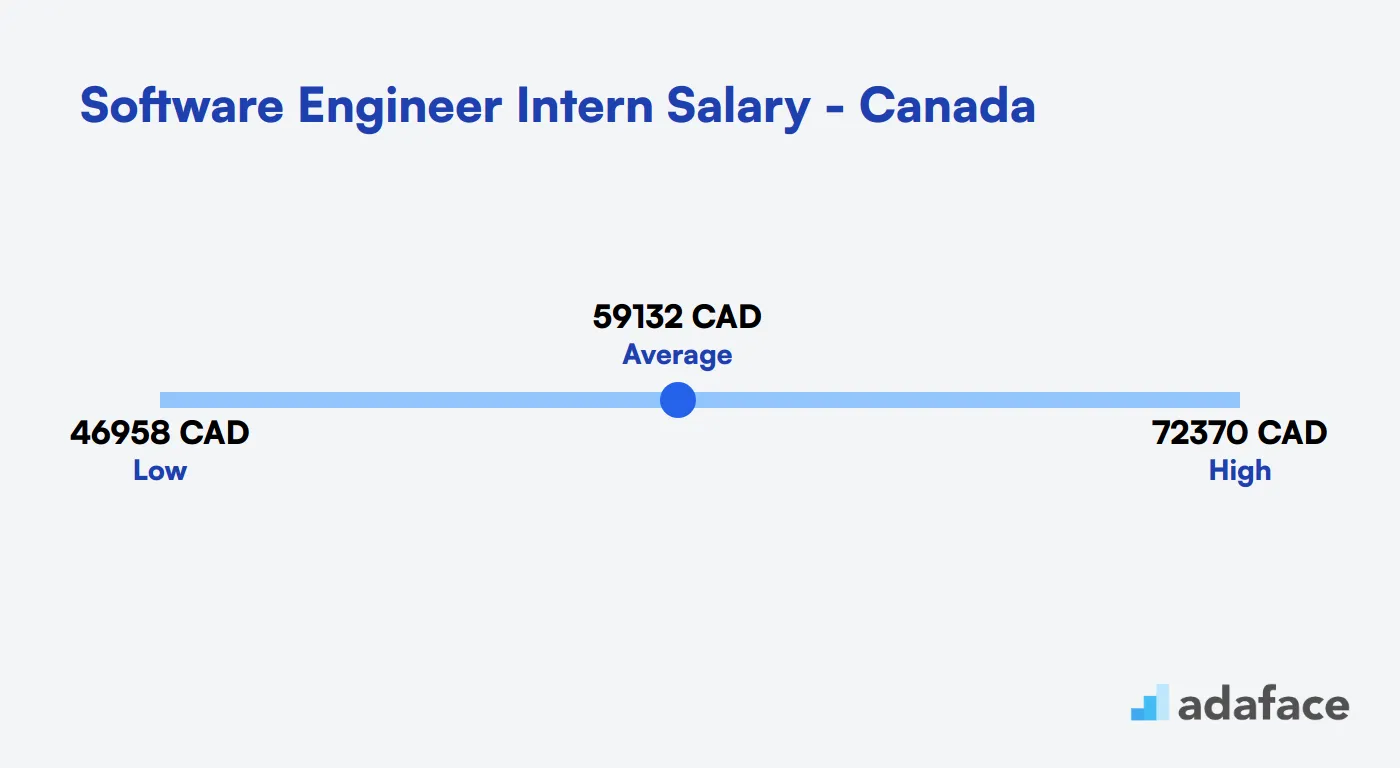
Software Engineer Intern Salary in India
The average salary for Software Engineer Interns in India ranges from ₹199,751 to ₹1,412,939 per year, with a median of ₹531,259. Bengaluru offers the highest average at ₹1,234,585, followed by Hyderabad at ₹1,555,331.
Salaries vary significantly based on location, company size, and the intern's skills. Top tech hubs like Bengaluru, Hyderabad, and Gurgaon generally offer higher compensation compared to cities like Indore or Thiruvananthapuram.
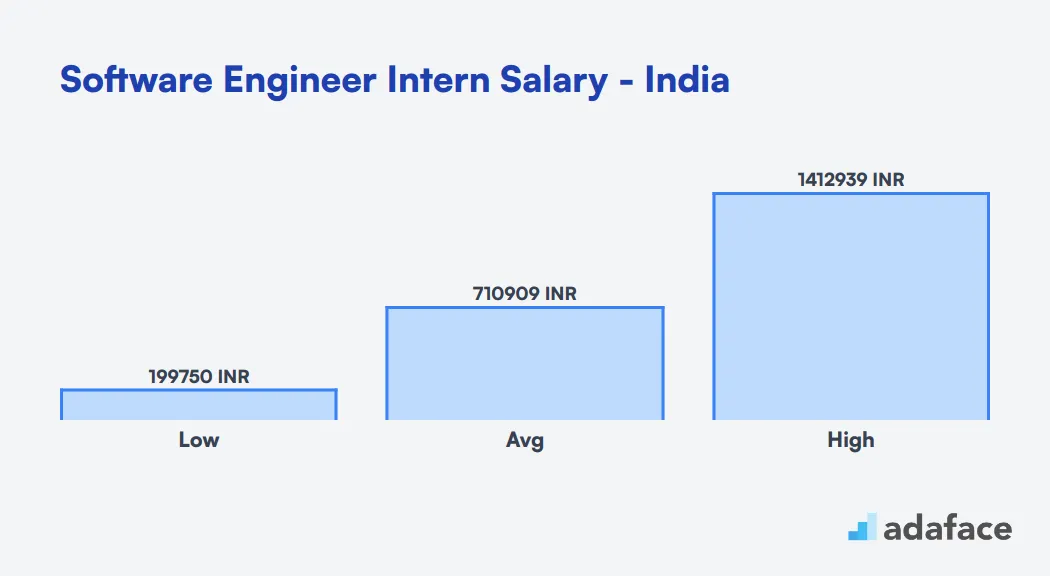
What's the difference between a Frontend and Backend Software Engineer Intern?
Many people confuse frontend and backend software engineer interns due to their similar job titles. However, these roles have distinct responsibilities and require different skill sets.
Frontend software engineer interns focus on the user-facing aspects of web applications. They work with languages like JavaScript, HTML, and CSS, using frameworks such as React or Angular. Their main tasks include designing UI components and ensuring cross-browser compatibility.
Backend software engineer interns, on the other hand, deal with server-side logic and database management. They typically use languages like Java, Python, or Ruby, and work with frameworks such as Node.js or Django. Their responsibilities include developing RESTful services and managing database systems.
While frontend interns collaborate closely with designers and product managers, backend interns often work alongside system administrators and database engineers. Frontend performance is measured by metrics like page load time and user engagement, whereas backend performance focuses on server uptime and response time.
| Frontend Software Engineer Intern | Backend Software Engineer Intern | |
|---|---|---|
| Primary Focus | User Interface, User Experience | Server-side Logic, Database Management |
| Key Programming Languages | JavaScript, HTML, CSS | Java, Python, Ruby |
| Tools and Frameworks | React, Angular, Bootstrap | Node.js, Django, Spring |
| Understanding of | Design Principles, Accessibility | APIs, Server Architecture |
| Role in Development Cycle | Build interactive web pages | Handle data processing |
| Typical Tasks | Design UI components, Ensure cross-browser compatibility | Develop RESTful services, Manage database systems |
| Collaboration With | Designers, Product Managers | System Administrators, Database Engineers |
| Performance Metrics | Page Load Time, User Engagement | Server Uptime, Response Time |
What are the ranks of Software Engineer Interns?
Hiring a Software Engineer Intern can often be confused with other roles due to the overlapping responsibilities and the transitional nature of internships. However, internships typically focus on learning and development within a structured framework, which is distinct from full-time roles.
- Junior Software Intern: This is often the first step for many students or recent graduates. Junior Interns are usually involved in basic tasks and shadow senior team members to gain an understanding of the company's working environment. Their duties can include assisting in coding, documentation, and performing tests.
- Mid-level Software Intern: Mid-level Interns have usually completed one or more internships before. They are more familiar with the company's processes and can handle more substantial tasks under supervision. They might work on small projects and are encouraged to contribute to team meetings.
- Senior Software Intern: Senior Interns are those who have had significant prior internships or work experience. They might lead small projects or take on more complex assignments. They often provide mentorship to junior interns and contribute to project planning as well.
For a detailed view on what responsibilities might be expected from an intern, you can read more in our detailed Software Engineer Intern job description.
Hire the Best Software Engineer Interns
Throughout this guide, we've discussed the importance of hiring software engineer interns and explored various stages of the hiring process—from crafting effective job descriptions to structuring interviews. Additionally, we highlighted key skills and qualifications to look for, and suggested platforms and tests to ensure you find the right fit for your team.
If there's one takeaway, it's that crafting accurate job descriptions and employing the right skills tests are crucial for making informed hiring decisions. For instance, using specific software engineering online tests can help you evaluate the candidates' technical abilities effectively. By integrating these strategies, you can streamline your hiring process and bring onboard interns that match your organization's needs.
Software Engineering Online Test
FAQs
Look for skills such as problem-solving, understanding of coding languages, adaptability, and teamwork. Consider technical skills like familiarity with data structures and algorithms.
An effective job description should clearly outline the responsibilities, required skills, and qualifications, as well as any expectations for the role. It's important to be concise but informative.
There are several platforms to consider, including university career centers, online job boards like LinkedIn, and specialized tech recruiting platforms.
Structure the process with a mix of technical assessments, such as coding tests, and behavioral interviews to evaluate cultural fit and communication skills.
Frontend interns focus on the user interface and user experience, while backend interns work on the server-side logic, databases, and application integrations.
Yes, case studies can help evaluate a candidate's problem-solving skills and creativity. Ensure the assignments are relevant to the kind of work they will be doing at your company.
Qualifications can include being enrolled in a computer science or related degree program, basic knowledge of coding languages, and some experience in software development projects.

40 min skill tests.
No trick questions.
Accurate shortlisting.
We make it easy for you to find the best candidates in your pipeline with a 40 min skills test.
Try for freeRelated posts
Free resources



